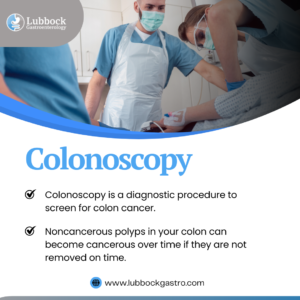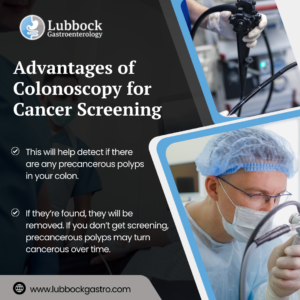Colonoscopy in Lubbock, Tx

Colonoscopy in Lubbock, Tx
Colonoscopy is a diagnostic procedure to screen for colon cancer. Noncancerous polyps in your colon can become cancerous over time if they are not removed on time.
During colonoscopy, noncancerous polyps are removed if they are found in your colon.
There are a number of warning signs that can indicate the need to have a colonoscopy. If you’re at risk of developing colorectal cancer, you will likely need to have periodic colonoscopy.
If you’re experiencing certain symptoms or signs, you may need to have colonoscopy. These symptoms or signs include:
- Blood in stools
- Frequent narrow or thin stools
- Change in bowel habits
- Abdominal pains or cramps
- Bloating
- Chronic fatigue
- Diarrhea
- Constipation
- Weight loss
What Do I Need to Do Before a Colonoscopy?
Before undergoing the procedure, you will need to first consult with your doctor to get all the necessary information. Below are other things that you need to do:
Adjust your medications
You will also need to adjust your medications before your procedure. Inform your doctor about the medications that you are currently taking or have recently taken.
Inform your doctor if you have recently taken medications that contain iron. You should also inform your doctor if you have diabetes, high blood pressure, or heart problems.
Follow a special diet
You will need to follow a special diet for a few days before your procedure. The aim of this special diet is to clean out your colon so that there is little or no stool remaining in your intestine.
It also allows your doctor to see the internal lining of your colon more clearly.
Avoid solid food for 1 to 3 days before your procedure. You can only drink clear liquids such as water and carbonated drinks.
Colored drinks such as red wine and purple liquids should be avoided as they can be confused with blood during the procedure. You shouldn’t eat or drink anything the night before your procedure.
Undergo a bowel prep
You should undergo a bowel prep so that you can pass out stool to clear out your bowel. Take laxatives to make you pass out stool more frequently.
Laxatives can be in the form of pills or powders which are dissolved in water or clear liquids. You may need to take laxatives for a few days before your procedure and also the night and morning before the procedure.
How does the colonoscopy procedure work?
Colonoscopy is a minimally invasive procedure used to check inside the colon and rectum for any abnormalities.
The procedure involves the use of a flexible tube known as colonoscope. A tiny camera is attached to the tip of the colonoscope with which your doctor sees the inside of your colon on a monitor screen.
Your doctor will then insert the colonoscope into your colon through your rectum and view the inside of your colon on a screen for any abnormalities, infections, and noncancerous or cancerous polyps.
Results and Follow-Up
Colonoscopy is used to check for abnormalities in the colon. These abnormalities can be abnormal tissues (biopsy) and abnormal growths (polyps), colon cancer, infection, or diseases.
Results from a screening can either be positive or negative. If your results show that any abnormality was found in your colon, then your result is positive but if no abnormality was found, then your result is negative.
If abnormal growths are found in your colon during the screening, they will be removed and taken to the lab for analysis to determine whether they are cancerous, precancerous, or noncancerous.
After your screening, you need to follow up by undergoing periodic colonoscopy screening.
If precancerous, noncancerous, or cancerous polyps were found and removed during your screening, you should get follow up colonoscopy screening every 3-5 years, depending on the size and number of polyps that were found in your colon.
Advantages of Colonoscopy for Cancer Screening

Advantages of Colonoscopy for Cancer Screening
Individuals who are 50 years and above are at higher risk of developing colon cancer. Having colonoscopy screening will help your doctor find out find there are precancerous or cancerous polyps in your colon.
It is recommended to get colonoscopy at least once every 10 years if you’re 50 years or older.
This will help detect if there are any precancerous polyps in your colon. If they’re found, they will be removed. If you don’t get screening, precancerous polyps may turn cancerous over time.
It is important to get colonoscopy screening at an early stage to prevent the development of colon cancer. Getting a screening can help prevent colon cancer. It can also help in the diagnosis and treatment of colon cancer.
What type of sedation or anesthesia will I receive for a colonoscopy?
Moderate sedation or deep sedation is usually administered during screening to make you sleep and relax during the entire procedure.
Midazolam is a mild sedative that is usually used for sedation during colonoscopy. An anesthetic known as propofol may be administered in some cases to prevent you from feeling pain.
At what age do people have a colonoscopy?
Colonoscopy screening is usually recommended for people who are age 45 to 75. Individuals who are at average risk of developing colorectal cancer should get their first screening at age 45.
Individuals who are age 50 and above should get colonoscopy screening at least once every 10 years.
Colonoscopy may not be recommended for people who are above 75 years old.
What diseases can be detected by a colonoscopy?
There are several diseases that can be detected by colonoscopy. These include:
Colon cancer
Colon cancer is one of the main diseases that can be detected by colonoscopy. Abnormal growths such as precancerous and cancerous polyps can be found in the colon.
When precancerous polyps are found, they are removed before they become cancerous.
It is important that you undergo colonoscopy at an early stage to prevent the development of colon cancer, particularly if you’re at an average risk of developing colon cancer.
Diverticulosis and Diverticulitis
Over time, food and bacteria can accumulate inside the pockets of your colon, and can lead to painful inflammation and infections known as diverticulitis with symptoms such as stomach pain, constipation, vomiting, fever, bloating and bleeding.
If the infections are not treated on time, a portion of your colon may need to be removed. Colonoscopy can be used to detect inflammation and infected tissues inside your colon.
Colitis
Colitis is a chronic inflammation of the colon. Colonoscopy can be used to detect and diagnose colitis.
Bleeding lesions
Bleeding lesions can be present in your colon. It can be used to detect if there are bleeding lesions in your colon.
Abdominal pains and other symptoms
Colonoscopy can be used to diagnose if the symptoms of abdominal pains, unexplained weight loss, cramping, or other symptoms that you’re experiencing are a result of colon disease. It is used to check inside the colon for any abnormalities or diseases.
FAQ
How quickly should I get a colonoscopy?
You should get your first colonoscopy screening at age 45, particularly if you have an average risk of developing colon cancer. After your first screening, you should get the next screening in the next 10 years until you’re aged 60.
Does it hurt to poop after a colonoscopy?
It may hurt to poop at first after a colonoscopy. The pain you may feel is caused by the colonoscope passed through your anus and having air pumped into your colon during the procedure.
You can ease the pain or discomfort by passing gas or walking around.
What is the fastest way to recover from a colonoscopy?
Drink plenty of water and take all medications as directed by your doctor. You can also take light work and rest for the day.
Why am I pooping so much after colonoscopy?
Before colonoscopy, you will need to take laxatives to make you poop more in order to clear out your colon.
After the procedure, you may continue to poop more than usual due to the effect of the laxatives and other medications used during the procedure. You can expect your bowel movements to return back to normal after a week.
Does stomach bloat after colonoscopy?
It is normal for your stomach to bloat after colonoscopy. Bloating usually lasts for just a day or two.
Lubbock Gastroenterology: Best Clinic to Get Colonoscopy in Lubbock, Texas

Best Clinic to Get Colonoscopy in Lubbock, Texas
It is important that you get your screening from an experienced medical professional. This will ensure your safety and comfort throughout the procedure.
Lubbock Gastroenterology is the best clinic to get colonoscopy in Lubbock, Texas. Dr. Sameer Islam, a trained Gastroenterologist with many years of experience conducts colonoscopy with high precision. You can be sure of your safety and accurate results.
Get in touch with Dr. Sameer Islam for your colonoscopy screening by Booking an Appointment.
